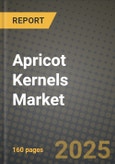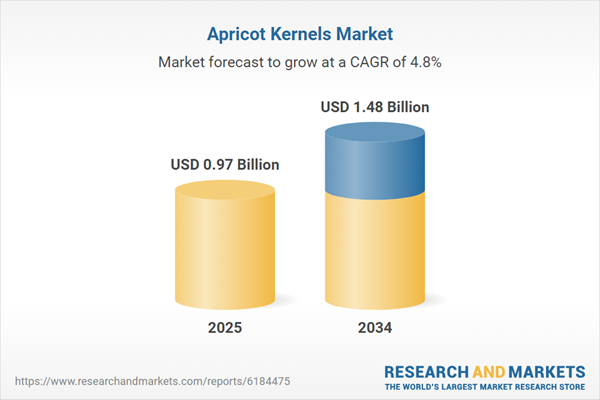Apricot Kernels Market
The Apricot Kernels market spans food, beverage, confectionery, bakery, snacks, and non-food uses such as cosmetics, nutraceutical carriers, and specialty oleochemicals. Two distinct value streams shape demand: edible sweet kernels used for marzipan-like pastes (persipan), pralines, cookies, liqueurs, and toppings; and bitter kernels primarily processed for oil extraction and carefully controlled flavoring because of their natural cyanogenic glycosides (amygdalin) that can release hydrogen cyanide. Buyers prioritize kernel grade (size, color, chip/break ratio), moisture, peroxide values for oil, microbiological specs, and tight allergen controls aligned with tree-nut labeling. On the culinary side, brands seek clean-label nut notes, Mediterranean pastry authenticity, and premium inclusions; on the personal-care side, cold-pressed apricot kernel oil is valued for its light sensory, high oleic/linoleic profile, and compatibility in serums, massage oils, and balms. Supply dynamics depend on orchard yields, sun-drying conditions, hand vs. mechanical cracking, and segregation of sweet/bitter varietals; traceability and authenticity are rising priorities to prevent almond substitution or unsafe bitter kernel leakage into food channels. Processing trends include roasting and blanching for flavor and safety, optical sorting to reduce defects, and de-bittering steps where permitted. Packaging innovation - oxygen and light barriers, nitrogen flushing, and tamper evidence - extends shelf life for kernels and oils across climate zones. As retailers and regulators tighten limits and guidance on cyanogenic compounds, the market is moving from opportunistic by-product trading toward programmatic, specification-driven sourcing with full documentation, origin transparency, and application support that de-risks audits for food and personal-care customers.Apricot Kernels Market Key Insights
- Sweet vs. bitter segregation is foundational
- Safety and compliance define awards
- Persipan and pastry authenticity
- Oil quality and sensory for personal care
- Sorting tech as a quality moat
- Adulteration & authenticity monitoring
- Sustainability and by-product valorization
- E-commerce and private label premiumize
- Packaging engineering for shelf life
- Risk and seasonality management
Apricot Kernels Market Reginal Analysis
North America
Demand concentrates in specialty bakery, natural snacks, and clean-beauty oils. Retailers emphasize allergen control, authenticity (sweet-kernel assurance), and recyclable packaging. E-commerce accelerates niche formats (milled, paste, roasted), while personal-care brands require oxidative-stability and contaminant screens. Co-packers value consistent granulation and low moisture for paste production.Europe
A strong confectionery heritage (persipan, pastries, liqueurs) sustains steady sweet-kernel demand under strict safety norms. Buyers insist on origin traceability, cyanogenic glycoside controls, and uniform size/color. Organic and fair-sourcing narratives resonate, while cosmetic formulators specify low-odor, cold-pressed oil with robust documentation. Private label bakes and premium patisserie drive year-round procurement.Asia-Pacific
Foodservice and bakery growth in metros lifts roasted and sliced kernels; regional confectionery adapts almond-style notes with apricot character. Personal-care brands adopt lightweight oils for summer climates, favoring rapid absorption. Importers stress clear segregation of bitter kernels and climate-resilient packaging. Online marketplaces expand DIY baking and cosmetic use.Middle East & Africa
Gifting confectionery and bakery segments adopt sweet kernels for premium assortments; halal/ethical sourcing and tamper-evident packs aid trust. Hot-chain logistics push nitrogen-flushed, light-barrier packaging. Cosmetic oils see steady uptake in spa and personal-care channels; documentation and batch traceability are essential for modern trade.South & Central America
Selective demand in artisan bakery, gelato, and specialty stores, with growing natural-beauty interest. Buyers prioritize stable supply, clear allergen labeling, and packaging that withstands humidity. Regional co-packers explore persipan blends to manage almond cost; importers favor suppliers offering dual food/cosmetic grades and quick COA turnaround.Apricot Kernels Market Segmentation
By Type
- Bitter
- Sweet
By Application
- Food & Beverages
- Personal Care & Cosmetics
- Pharmaceutical
- Others
Key Market players
BATA FOOD, Kenkko Corporation, Farmeks, Izmir Organic, Chengde Yaou Nuts & Seeds Co. Ltd., Zhangjiakou Yongchangyuan Kernel Food Co. Ltd., Akdalar Dried Food Company, ApricotKing, National Raisin Company, Sun-Maid Growers of California, Red River Foods, Traina Home Grown, Ziba Foods, Kayisicioglu Apricot, B & R Farms.Apricot Kernels Market Analytics
The report employs rigorous tools, including Porter’s Five Forces, value chain mapping, and scenario-based modelling, to assess supply-demand dynamics. Cross-sector influences from parent, derived, and substitute markets are evaluated to identify risks and opportunities. Trade and pricing analytics provide an up-to-date view of international flows, including leading exporters, importers, and regional price trends.Macroeconomic indicators, policy frameworks such as carbon pricing and energy security strategies, and evolving consumer behaviour are considered in forecasting scenarios. Recent deal flows, partnerships, and technology innovations are incorporated to assess their impact on future market performance.
Apricot Kernels Market Competitive Intelligence
The competitive landscape is mapped through proprietary frameworks, profiling leading companies with details on business models, product portfolios, financial performance, and strategic initiatives. Key developments such as mergers & acquisitions, technology collaborations, investment inflows, and regional expansions are analyzed for their competitive impact. The report also identifies emerging players and innovative startups contributing to market disruption.Regional insights highlight the most promising investment destinations, regulatory landscapes, and evolving partnerships across energy and industrial corridors.
Countries Covered
- North America - Apricot Kernels market data and outlook to 2034
- United States
- Canada
- Mexico
- Europe - Apricot Kernels market data and outlook to 2034
- Germany
- United Kingdom
- France
- Italy
- Spain
- BeNeLux
- Russia
- Sweden
- Asia-Pacific - Apricot Kernels market data and outlook to 2034
- China
- Japan
- India
- South Korea
- Australia
- Indonesia
- Malaysia
- Vietnam
- Middle East and Africa - Apricot Kernels market data and outlook to 2034
- Saudi Arabia
- South Africa
- Iran
- UAE
- Egypt
- South and Central America - Apricot Kernels market data and outlook to 2034
- Brazil
- Argentina
- Chile
- Peru
Research Methodology
This study combines primary inputs from industry experts across the Apricot Kernels value chain with secondary data from associations, government publications, trade databases, and company disclosures. Proprietary modeling techniques, including data triangulation, statistical correlation, and scenario planning, are applied to deliver reliable market sizing and forecasting.Key Questions Addressed
- What is the current and forecast market size of the Apricot Kernels industry at global, regional, and country levels?
- Which types, applications, and technologies present the highest growth potential?
- How are supply chains adapting to geopolitical and economic shocks?
- What role do policy frameworks, trade flows, and sustainability targets play in shaping demand?
- Who are the leading players, and how are their strategies evolving in the face of global uncertainty?
- Which regional “hotspots” and customer segments will outpace the market, and what go-to-market and partnership models best support entry and expansion?
- Where are the most investable opportunities - across technology roadmaps, sustainability-linked innovation, and M&A - and what is the best segment to invest over the next 3-5 years?
Your Key Takeaways from the Apricot Kernels Market Report
- Global Apricot Kernels market size and growth projections (CAGR), 2024-2034
- Impact of Russia-Ukraine, Israel-Palestine, and Hamas conflicts on Apricot Kernels trade, costs, and supply chains
- Apricot Kernels market size, share, and outlook across 5 regions and 27 countries, 2023-2034
- Apricot Kernels market size, CAGR, and market share of key products, applications, and end-user verticals, 2023-2034
- Short- and long-term Apricot Kernels market trends, drivers, restraints, and opportunities
- Porter’s Five Forces analysis, technological developments, and Apricot Kernels supply chain analysis
- Apricot Kernels trade analysis, Apricot Kernels market price analysis, and Apricot Kernels supply/demand dynamics
- Profiles of 5 leading companies - overview, key strategies, financials, and products
- Latest Apricot Kernels market news and developments
Additional Support
With the purchase of this report, you will receive:- An updated PDF report and an MS Excel data workbook containing all market tables and figures for easy analysis.
- 7-day post-sale analyst support for clarifications and in-scope supplementary data, ensuring the deliverable aligns precisely with your requirements.
- Complimentary report update to incorporate the latest available data and the impact of recent market developments.
This product will be delivered within 1-3 business days.
Table of Contents
Companies Mentioned
- BATA FOOD
- Kenkko Corporation
- Farmeks
- Izmir Organic
- Chengde Yaou Nuts & Seeds Co. Ltd.
- Zhangjiakou Yongchangyuan Kernel Food Co. Ltd.
- Akdalar Dried Food Company
- ApricotKing
- National Raisin Company
- Sun-Maid Growers of California
- Red River Foods
- Traina Home Grown
- Ziba Foods
- Kayisicioglu Apricot
- B & R Farms.
Table Information
| Report Attribute | Details |
|---|---|
| No. of Pages | 160 |
| Published | November 2025 |
| Forecast Period | 2025 - 2034 |
| Estimated Market Value ( USD | $ 0.97 Billion |
| Forecasted Market Value ( USD | $ 1.48 Billion |
| Compound Annual Growth Rate | 4.8% |
| Regions Covered | Global |
| No. of Companies Mentioned | 15 |









